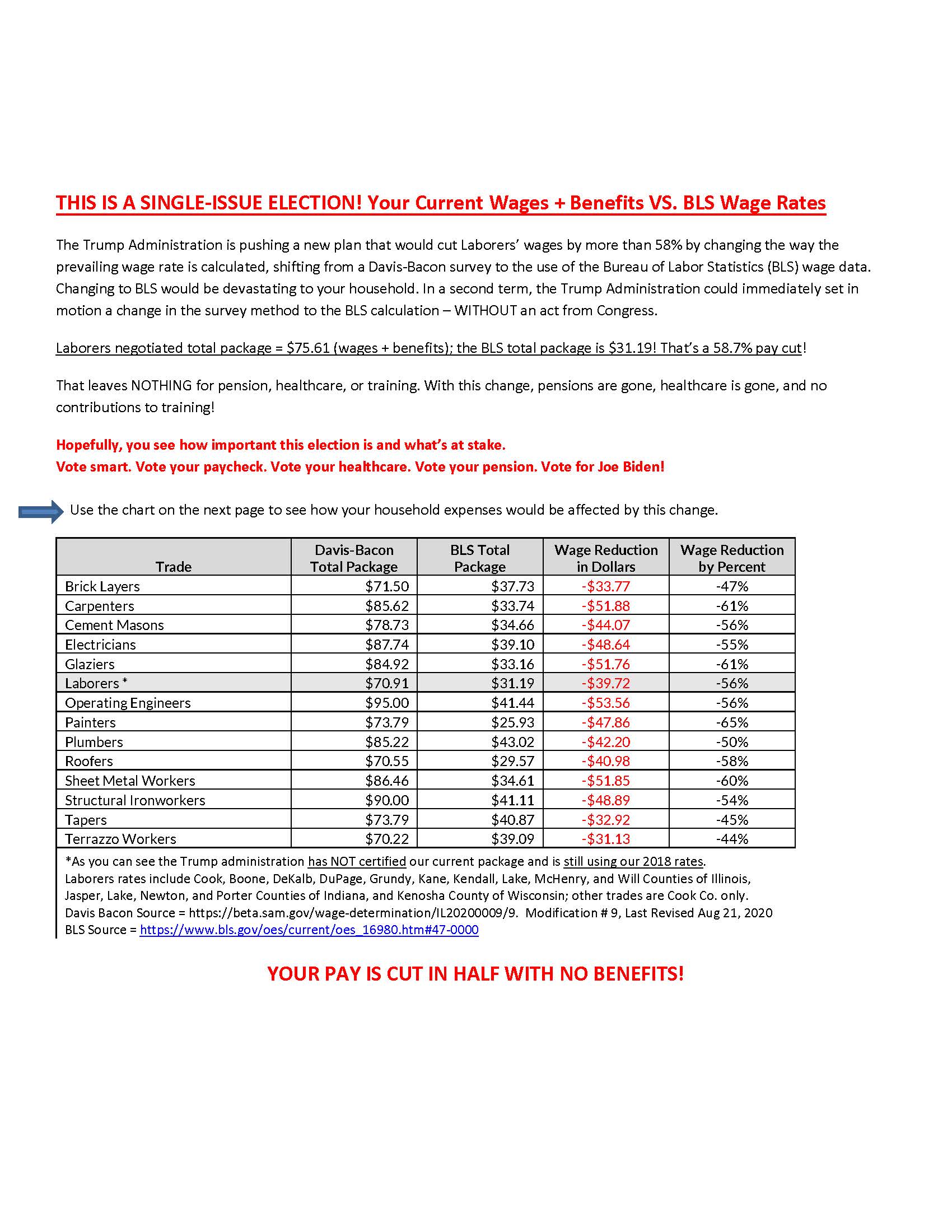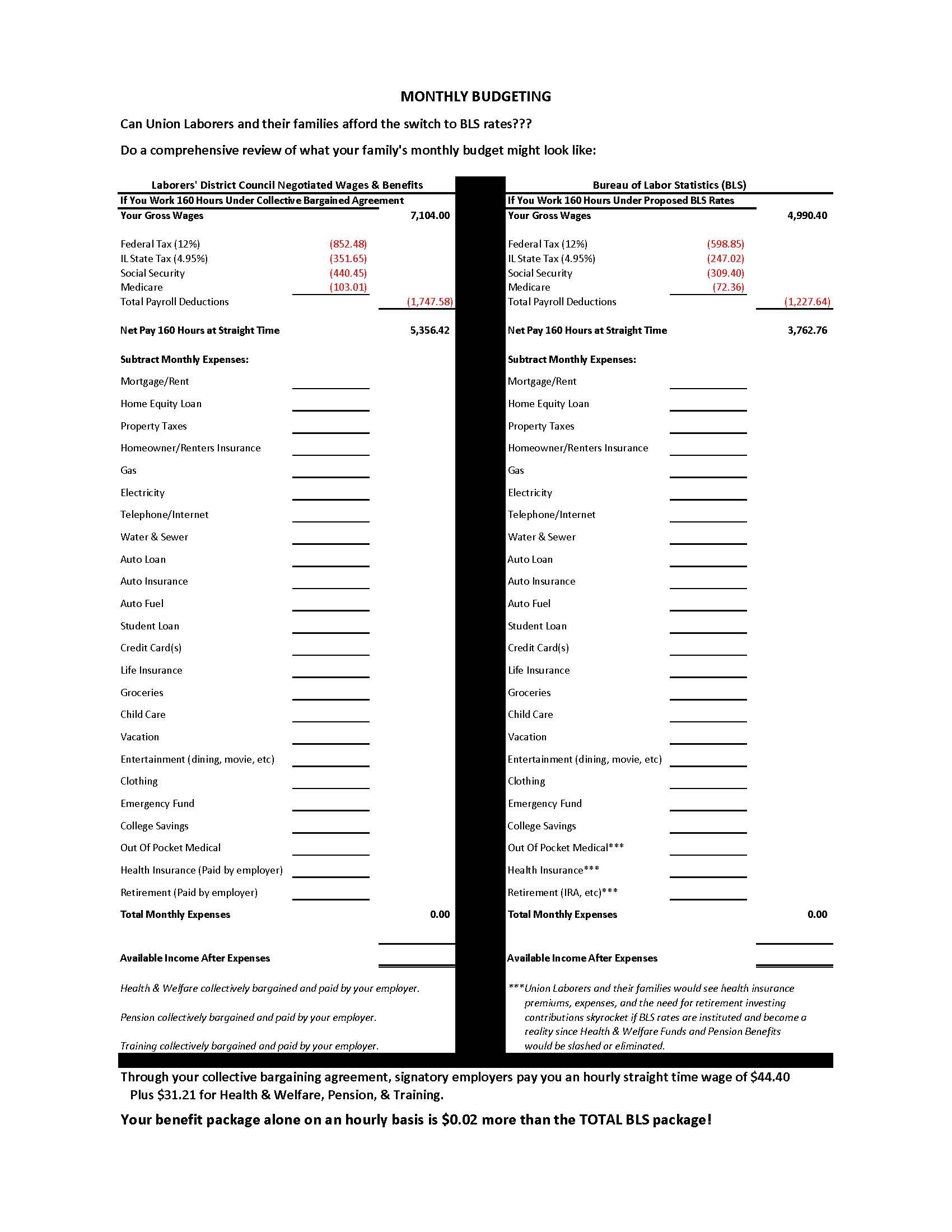Trump Administration
Anti-Union Actions by the Trump Administration
Table of Contents
The National Labor Relations Board Under Trump
Trump’s National Labor Relations Board Is Sabotaging Its Own Mission
50 Reasons the Trump Administration is Bad for Workers
Trump Administration Pushing Plan to Cut Laborers' Wages
Trump likes to portray himself as pro-worker, but like many of his assertions nothing could be further from the truth.
Following is a short explanation of what Trump’s NLRB is doing to destroy unions and the middle class. All these radically pro-business, anti-worker rulings will negatively affect our future wages, benefits, and pensions. With another four years of Trump, everything organized labor has fought for will ALL be up in smoke.
The National Labor Relations Board under Trump
The Anti-Union Hit List. The Trump Administration’s Labor Board General Counsel, who is known for his role in busting the PATCO strike in the 1980s, issued a memo regarding his anti-union priorities immediately after taking office. The Trump administration has implemented their anti-union priorities at a very rapid pace, including the following decisions.
Cracking Down on Bannering, the Rat, and the Fat Cat. (Advice Memorandum in Case 13-CC-225655, IBEW Local 134 (December 20, 2018)). The Trump administration issued an advice memo finding that a building trades union’s use of a large stationary banner and a large, inflatable fat cat was unlawful secondary picketing activity. The administration has directed that all cases involving stationary bannering are to be sent to Washington D.C. pending a decision that is likely to restrict the right to use stationary banners. The administration has brought multiple cases challenging the use of the inflatable rat around the country.
Cracking Down on Picketing. (Preferred Building Services, Inc., 366 NLRB No. 159 (2018)). The Trump National Labor Relations Board (“NLRB”) made it more difficult to picket a subcontractor, finding that the workers were supposedly attempting to pressure the property manager rather than their own employer.
Allowing Employers to Search Employees’ Personal Vehicles. (Verizon Wireless, 369 NLRB No. 108 (2020)). The Trump Board held that employers don't violate the labor law when they monitor or search employees’ personal vehicles on company premises.
Giving Employers the Power to Restrict Employee Conversations about the Union at Work. (Wynn Las Vegas, 369 No. 91 (2020)). The Board issued a decision making it easier for Employers to restrict employee’s rights to talk to their co-workers regarding the Union on work time, including asking a coworker to join the union, asking a coworker to vote to strike, or asking a coworker to vote to ratify a contract.
Undermining Building Trades Union Agreements. (Proposed Rule issued on August 12, 2019). The Trump Board proposed a rule questioning whether building trades union agreements properly recognize the union as majority representative even when the agreements contain language that recognizes the union as majority representative. This would make it easier for contractors to walk away from the contract after it expires without attempting to negotiate a new agreement.
Undermining the Financial Strength of Unions. (Valley Hospital Medical Center, Inc. d/b/a Valley Hospital Medical Center, 368 NLRB No. 139 (2019); Memorandum GC 19-04 (February 22, 2019) – “Unions’ Duty to Properly Notify Employees of Their General Motors/Beck Rights and to Accept Dues Checkoff Revocations after Contract Expiration”; Advice Memo in Case 32-CB-21981, UFCW Local 5 (January 22, 2019)). The Trump administration ruled that employers can unilaterally cut-off deductions of union dues after contract expiration, turning off the primary means of financial support for the union. The Trump administration also has taken the position that unions are required to advise new employees that they can get a discount on dues, and what percentage discount, if they do not join the union.
Denying Remedies for Legal Violations. (United Parcel Service, Inc., 369 NLRB 1 (2019)). The Trump administration declared that workers generally cannot pursue remedies under the National Labor Relations Act if they have a grievance procedure available, taking away a meaningful remedy for federal labor law violations.
Increasing Legal Liability for Unions. (Memorandum GC 19-01 (October 24, 2018) – “General Counsel’s Instructions Regarding Section 8(b)(1)(A) Duty of Fair Representation Charges” and GC Memo 20-09 (2020). The Trump administration adopted a policy of attempting to make it easier to sue unions and file charges against them regarding their representation of employees, even for non-members. This is likely to require the union to spend more time and more of the members’ money defending against lawsuits.
Making It Easier To Misclassify Workers As Independent Contractors. (SuperShuttle DFW Inc., 367 NLRB No. 75 (Jan. 25, 2019)). The Trump administration adopted a more difficult test to show that an employer has misclassified an employee as an independent contractor, making it harder to show that an employee’s labor law rights were violated.
Misclassifying Workers Does Not Violate the Law. (Velox Express, Inc., 368 NLRB No. 61 (2019). The Trump Board ruled that misclassifying employees as independent contractors does not violate the National Labor Relations Act (“NLRA”) even though misclassification denies all of an employee’s rights under the NLRA.
Making It Easier For Employers To Withdraw Recognition From The Union. (Johnson Controls, Inc., 368 NLRB No. 20 (2019)). The Trump administration ruled that an employer can stop recognizing the union at the end of the contract if it believes the union has lost majority support, and the Union cannot challenge it except by filing for an election. This makes it easier for employers to walk away from collective bargaining.
Making It Easier to Vote the Union Out. (Mountaire Farms Inc., 05-RD-256888. On July 7, 2020, the Trump Board indicated that it was seeking to eliminate the rule that prohibits filing for a decertification election to vote out the Union during the term of a contract. This would allow for elections to vote out the Union virtually at any time.
Limiting Access to Property for Union Activities. (Kroger Limited Partnership, 368 NLRB No. 64 (2019)). The Trump administration allowed a non-union employer to bar union representatives from its property even when it had permitted other civic, charitable, or promotional groups access to the property for purposes of solicitation.
Limiting Union Bargaining Rights. (MV Transportation, 368 NLRB No. 66 (2019) & Mercy Health General Campus, 07-CA-258425 (June 10, 2020)). The Trump administration held that an employer can make a unilateral change to employees’ working conditions without bargaining with the union as long as a management rights clause in the contract supposedly applies. The Trump administration has also held that during the COVID-19 pandemic employers can make unilateral changes to employment terms and bargain later after the changes have been made.
Delaying Union Elections and Increasing Legal Costs. On December 18, 2019, the NLRB adopted a final rule slowing down union organizing elections and requiring that legal disputes be litigated before an election is ordered. This will increase the cost and impose delays on organizing campaigns, threatening to take the steam out of workers’ efforts to form unions due to expense and delays.
Restricting Use of Employer Email for Union Communications. (Caesars Entertainment d/b/a/ Rio All-Suites Hotel and Casino, 368 NLRB No. 143 (2019)). The Trump Board held that employees do not have a right to use employer-owned email accounts for union activity.
Promoting So-Called “Right to Work”
The President Has Stated He “Loves” Right to Work and Has Made It the Reality for Public Employees Throughout the Country. The current administration appointed the Supreme Court Justice that provided the fifth vote to require right to work for all public employees throughout the country in the Janus case. (Janus v. AFSCME Council 31, 138 S.Ct. 2448 (2018)). President Trump has spoken out in favor of right to work: “I love the right to work, it is better for the people. You are not paying the big fees to the unions.”
More on Trump's NLRB Rulings
You can read more about the Trump NLRB rulings in this article: Trump’s National Labor Relations Board Is Sabotaging Its Own Mission: The federal agency that’s supposed to protect union rights is instead championing the interests of bosses
50 Reason the Trump Administration is Bad for Workers
50 reasons the Trump administration is bad for workers: President Trump has said he would ‘protect’ and ‘fight for’ workers. Instead, his administration has systematically done the opposite. This report provides a review of the Trump administration’s 50 most egregious attacks on working people since Trump took office. This analysis reveals that President Trump’s time in office has been marked by a clear commitment to advancing a pro-corporate, anti-worker agenda.
It is critical that a new administration work with the same diligence from Day One to reverse these actions. But simply reversing the Trump anti-worker agenda will not be enough. A new administration must advance a workers’ first-100-day agenda that includes measures that provide working people with the rights and protections they need and deserve.
Here are 50 ways the Trump administration has failed workers, starting with recent actions (or inactions) and extending back to the beginning of Trump’s presidency. Read the EPI Report.
Trump Administration Pushing Plan to Cut Laborers' Wages



 Translate
Translate